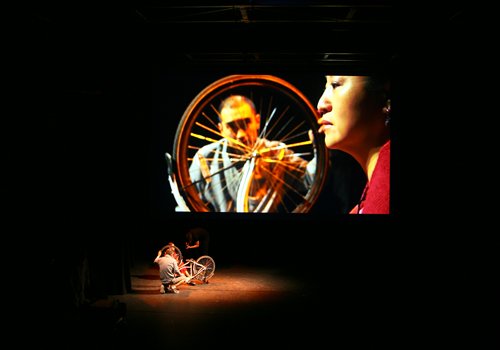New 'take' on Ibsen

Actors perform Ibsen in One Take in Rotterdam in September. Photo: Courtesy of Wang Chong
For avant-garde theater director Wang Chong, multimedia is not only a doorway to rediscovering the works of Henrik Ibsen, but also what connects his stories of social struggle to modern China.
As the artistic director of Théatre du Rêve Expérimental, Wang has been very productive over the past few years. Collaborating with cinematographer Liang Anzheng and producer Li Yi, the team has created a number of works that have redefined contemporary Chinese theater.
His latest work, Ibsen in One Take, was performed at Festival De Keuze Rotterdam in late September to rave reviews.
Co-produced by Norwegian producer Inger Buresund and Li Yi, Ibsen in One Take will continue its world tour with stops in Shanghai and Guangzhou in November before heading over to Norway and Ireland in 2014.
Modern isolation
More traditional productions of the celebrated 19th century Norwegian dramatist have appeared frequently in Chinese theaters. Many of Ibsen's pioneering works of modern realistic drama, such as Peer Gynt and The Master Builder, have been adapted into Chinese versions and performed in such prominent venues as the National Centre for the Performing Arts.
However, according to the show's program notes, Ibsen in One Take is "neither a medley of Ibsen's masterpieces nor an original piece inspired by his work. It is both these things, and more."
The script, written by Norwegian playwright Oda Fiskum, recounts the life of a Chinese man from boyhood to old age through the combination of plot points from 27 Ibsen plays.
"I rewrote and adapted the old Norwegian language into my own, then into English, all the while keeping Chinese in mind," wrote Fiskum, a long-time China resident, in an email interview.
Fiskum explains Ibsen's works experienced popularity in China as early as the 1910s and had great influence on authors of the May Fourth Movement (1919) such as Cao Yu.
"Ibsen's works are lonely. You feel lonely after reading them, and they reflect a deep loneliness in human society that I think is very relevant today, especially in a country like China where people live physically so close together," said Fiskum.
"What we wanted to bring out in this script is the remarkable psychology of his characters and human relationships. These are often overlooked in China in favor of his social commentary," she added.
According to Dutch theater critic Joost Ramaer, "the emotional handicaps, the not-listening, the not-seeing, the indecisiveness of the characters - it is all painfully recognisable Ibsen. But with the help of his two dimensions, Wang also sculpts this material, just as recognisably, into present day China."
Pixelated plot points
Wang's works are known for creating an environment of interaction between actors and audience through the use of multimedia, particularly live video feeds.
"Live media on stage reflects our media-filled lives, and how we constantly perform for and are watched by lenses that are everywhere," Wang told the Global Times.
While Ibsen in One Take resembles Wang's previous productions, which use several cameras and video edited on-the-fly to provide audiences with different angles of the story, Ibsen in One Take also uses uninterrupted live video - as the title implies.
"The movie jumps back and forth between the main character's reality, memory, imagination and dreams. It was a crazy attempt but we eventually found our own language," said Wang.
The format not only poses a technical challenge for the production team, but also a philosophical challenge to audiences, evoking questions Wang has asked before, such as "how real is theater?", "how fake can reality be?" and "what is the audience's role?"
Experiments in tradition
Wang has benefited greatly from his multi-cultural team during his recent world tours. During his production of Kurukulla in New York this May, Wang employed a Chinese scriptwriter and a cast comprised of Caucasian, African American and Asian American actors.
Although many of Wang's Théatre du Rêve Expérimental productions such as The Agony and the Ecstasy of Steven Jobs and Central Park West were inspired by big names like Woody Allen, they also maintain a sense of originality from medium to concept.
This latest collaboration, which blends originality with theatric tradition, has helped Théatre du Rêve Expérimental gain commercial success and global recognition.
However, Wang and Fiskum had their sights set higher than numbers at the box office - seeking to help the world discover Chinese contemporary theater. "Wang and I wanted to find the intersections in Ibsen's works that on one hand were relevant to contemporary China but at the same time had a timeless, global quality," said Fiskum.
"Working internationally is a trend," Wang noted, adding his ambition is to present a contemporary China to the world. "We are not interested in selling the old image of China to the West. No matter who our audiences are, I just want to share how I see Chinese people and society; the way we love and live, our problems and dreams."